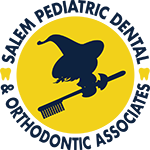
Most children have heard of wisdom teeth. Friends, older siblings and parents will share tales of wisdom teeth and the problems they cause. As a result, children are often unnecessarily nervous about wisdom teeth. How much do you and your children really know about wisdom teeth and how they are evaluated?
The last teeth to erupt into the mouth are the third molars, also known as the wisdom teeth. For most patients, this occurs around 18 years of age (presumably the age of wisdom). The third molars erupt directly behind the second molars (also known as the 12 year molars) which have erupted behind the first molars (also known as the 6 year molars). In an ideal situation, the wisdom teeth develop in a position that is in line with the other teeth and have plenty of available space at the back of the mouth to grow into. For those individuals who are fortunate enough to have this ideal situation, no special treatment of these teeth is necessary.
For individuals whose teeth develop in an unfavorable position or who have a lack of space available in the mouth, normal growth and eruption of the teeth is blocked by bone, gum tissue or other teeth. This is referred to as impaction of the wisdom teeth. A tooth can be partially or completely impacted depending on the specific alignment of teeth and bones.
Impacted and partially impacted wisdom teeth can lead to a number of problems for patients if left untreated. They can become painful and lead to infection. They can cause the development of cavities or other types of damage on neighboring teeth. They can also result in the development of cysts and bone loss in the jaws. They can even result in gum disease.
Beginning in the early teenage years, we are evaluating the development of the wisdom teeth using both a panoramic radiograph (the x-ray where the machine goes all the way around the patient’s head) and clinical exams. If problems are suspected with the position or spacing of the developing wisdom teeth, a referral to an oral surgeon will be considered. Often, wisdom teeth extraction is the best way to avoid complications later in life. The oral surgeon will help to determine the ideal age at which to extract problematic or impacted wisdom teeth. For most patients, extraction prior to age 25 allows for the fastest healing and recovery process.
For more information including a short video demonstrating what impacted wisdom teeth look like, visit the Wisdom Teeth topic page from the American Dental Association. If you have specific questions about your child’s wisdom teeth, ask at your next checkup or call our office and one of our team members will be happy help you.
ShareDEC
2013

About the Author:
Since 1972, Salem Pediatric Dental & Orthodontic Associates has provided comprehensive preventive and therapeutic oral health care for infants and children through adolescence including those with special health care needs. We proudly serve the communities of Salem, Lynn, Peabody, Danvers, Marblehead, Swampscott, Beverly, and many more.